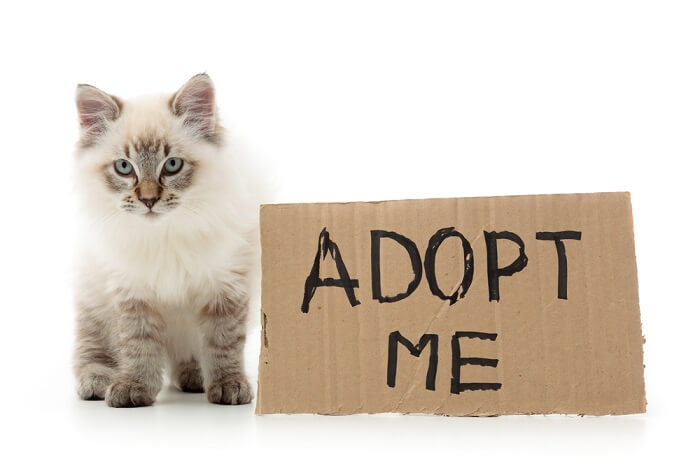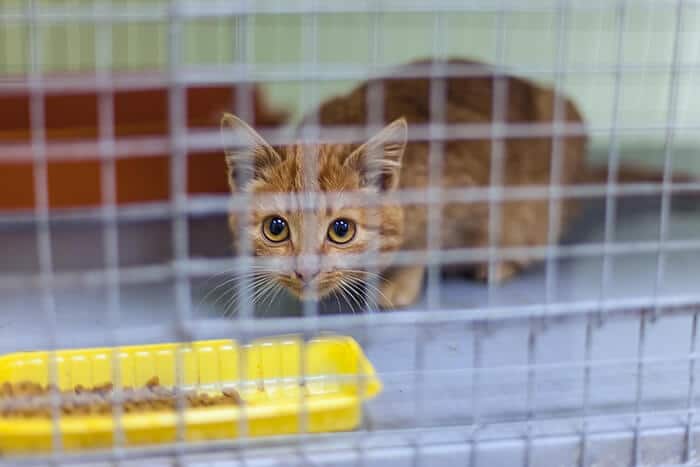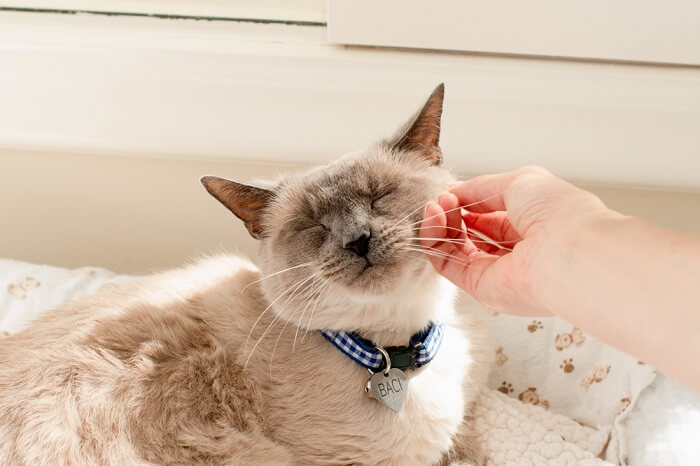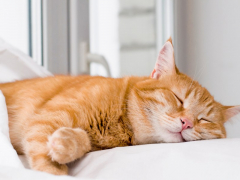
Adopting a cat, kitten, or any other pet is a lifetime commitment, so it’s important to do your homework. Too many people think cats are disposable; hence the populations of community cats and full shelters. Asking yourself the following 10 questions will help you to make a wise decision.
1. Do I Really Want a Cat?
A cat is not a small dog. While cats can be trained, do not expect them to behave in the same way as dogs. Yes, they do require attention. Often considered solitary, cats blossom and thrive when given attention. That includes playtime, grooming sessions, conversations using their name – they do learn their names, even if it’s acknowledged with an obligatory flick of the ear.
If you’re completely new to cat ownership, read up on cat behavior. There’s great information on this website and from experts such as Amy Shojai and Pam Johnson Bennett.
2. Should I Choose a Shelter Kitty or Purebred Kitty?
If you’re choosing a shelter kitty, take the time to visit with them to get to know their personalities. Spend some time in the community room of your local shelter and see how the kitties respond to you. Consider a bonded pair, especially if you’re out of the house for long periods of time.
Interested in a purebred cat? Don’t get taken in by ads like those on craigslist. Facebook has many breed-related groups, but scammers lurk even there. Get to know the breeders and their cats before inquiring.
Reputable breeders have waiting lists, screen prospective owners carefully, include health certificates, and often spay or neuter before releasing their kittens.
3. Do I Want an Adult Cat or a Kitten?

Using a humane trap, like those implemented in TNR (trap, neuter, return) efforts can help you to capture your lost cat.
The age at which a cat is socialized has a big effect on her personality. The critical age is 2 to 10 weeks. The longer a kitten stays with her litter, the more likely she’ll be well socialized; cats learn boundaries for behavior such as rough play and biting from their littermates. However, so much depends on getting to know the personality of a particular cat.
4. Am I Allergic?
The allergen, primarily Fel d 1, in cats comes from the saliva. If you (or a family member) suspect you are allergic, be sure to spend some time with cats, either at a shelter or a friend’s house, before adopting.
If you experience symptoms, wash your hands after petting your cat and keep your hands away from your face. Consider creating a cat-free zone, such as your bedroom. Brush your cat frequently and think about getting her used to being bathed.
Some breeds of cats (Russian Blues, Siberians) are said to be hypoallergenic, but remember that this is not a guarantee that you won’t experience symptoms around them.
5. How Will I Prepare My Home?
You should have a quiet room set up for your new cat, keeping in mind that each cat chills out in her own way before being allowed to explore the whole house.
Provide the following:
- Comfy bed
- Boxes for hiding
- Litter box
- Scratchers (tall and short)
- Toys
- Food and water bowls
6. Am I Ready To Get To Know My New Kitty?

Bonding with a cat requires attention and patience.
Each cat has a different personality and getting to know your own cat takes a bit of time and patience. Much depends on early socialization.
Some are shy and sensitive to loud noises such as the monster vacuum cleaner. Others are cuddly and gregarious. You will have to learn their preferences – such as neck and chin scratches rather than picking up and holding.
7. Am I Ready To Provide Veterinary Care?
Don’t wait until there’s an emergency or your cat is very ill before finding a veterinarian. Set up a wellness visit shortly after your kitty comes home to set up a baseline. Ask about a schedule for vaccines that’s sensible for your cat’s lifestyle; the American Animal Hospital Association has updated its policy listing core – FHV-1, FCV, FPV, rabies, and FeLV (cats younger than 1 year old) and non-core (optional) vaccines.
If your adopted cat is older, bloodwork can help detect potential problems such as kidney failure. Ask if the veterinarian can handle 24/7 emergencies or if they work with a nearby facility.
8. Will I Get Pet Insurance for My Cat?
Pet insurance for cats could make all the difference in the world if your cat is diagnosed with a serious illness. Read the policies carefully: See what they include in terms of regular wellness checkups and vaccines, pre-existing conditions, deductibles, spending caps, emergency care.
As an alternative, create a designated savings account to cover veterinarian expenses.
9. Do I Know How To Check for Problems?
Do a regular hands-on exam to check for lumps or bumps or sores. An exam can be done with regular brushing, which most cats enjoy. It can add to the bonding experience with your cats. Claw clipping and tooth brushing should also be a part of your routine.
Both can be done gradually to get your cat used to the experience and minimize stress. Keep in mind that each cat reacts differently.
10. Do I Know What Is Normal for a Cat, Physically and Behaviorally?
Any changes – lethargy, hiding, aggression – could signal illness. Addressing problems early on can prevent major expenses and maintain your cat’s quality of life. You will want to watch your cat closely to identify potential problems before they snowball.
Additional Tips
If you decide to adopt a cat, here are a few tips to help you welcome your new friend into the home:
1. Talk to Them, Using Their Name
It may sound corny, but tell them that they’re safe and loved and that they’re beautiful. They’ll get used to the sound of your voice and you’ll see responses like purring, kneading, eye kisses.
2. Schedule Playtime
Fishing pole toys are always popular, catnip stuffed toys, crinkle balls, spring. Each cat develops her preferences.
3. Feed the Best Food You Can Afford
It’s the best investment you can make to ensure your cat’s health. There’s an overwhelming amount of information on the internet, but I’ve provided some good Resources for Cat Nutrition here.
The best options include a variety high quality canned foods (a variety prevents finickiness or deficiencies in a single brand), a pre-made raw diet, or homemade, fed in timed feedings, three or four times a day. (Kittens, of course, should be fed more frequently.) Dry food, despite its popularity, is controversial; it’s often cited as contributing to obesity, diabetes, and urinary issues.
Most cats fall easily into a feeding schedule and will hold you to it! And, according to cat behaviorist Jackson Galaxy, cats are built to hunt, catch, kill, and eat, so keep that in mind when scheduling playtime and feeding time for your cat.
Frequently Asked Questions
Should I get one cat or two?
A bonded pair is a good idea if you’re gone all day. Cats usually enjoy having a companion, but remember that some may prefer to be an “only” cat.
What should I feed my cat?
Feed the best quality food you can afford. A variety of foods prevents finickiness and any deficiencies or problems that may be found in a single brand.
How often should I feed my cat?
Morning, evening, and before bedtime; a meal before bedtime will help prevent early morning wake-ups. Kittens should have an extra meal or two for the first several months since they are growing quickly.
When should I take my cat to the veterinarian?
Schedule a wellness visit when you first get your cat. If your cat shows signs of illness take her to the veterinarian before she is seriously sick. Obtaining pet insurance will help cushion major expenses.






